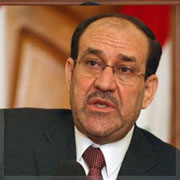-
(单词翻译:双击或拖选)
Maliki: Immunity1 Key Issue in US Withdrawal2
Iraqi Prime Minister Nouri al-Maliki says his country's refusal to grant immunity from prosecution3 to U.S. troops led to President Barack Obama's decision to withdraw the remainder of American forces by the end of the year. Some in Iraq say they worry about continued fragile security, while many others say that nearly nine years after the U.S.-led invasion, it's past time the Americans go home.
Prime Minister Maliki said the pull-out was according to schedule and that both sides were obliged to carry it out.
But, speaking Saturday, he noted4 that any chance of extending the mission collapsed5 over the issue of immunity.
The prime minister said Iraqi political factions6 rejected the notion of U.S. forces in Iraq working outside Iraqi laws. That ban on immunity appeared to extend to any American military personnel sent to Iraq after this year to provide training.
The U.S. had been adamant7 that its forces would have immunity, a protection provided by other countries where American troops are stationed.
 |
| Iraqi Prime Minister Nuri al-Maliki (file photo). |
Despite the impasse8, U.S. Secretary of State Hillary Clinton said Saturday that the withdrawal will not end American commitment to Iraq. During a visit to Tajikistan, Clinton added that instead, it marked a new phase of U.S.-Iraqi relations and that American would have a continuing, "robust9" presence in the region.
In the streets of Baghdad, the reaction to news of the withdrawal was generally positive.
Resident Bilal says the U.S. made the right decision to pull out: the Americans leave behind destruction and sedition10, but Iraqis will rebuild the country.
While many Iraqis welcomed the U.S. invasion that toppled Saddam Hussein in 2003, that soon faded as the oppression of the Saddam years was replaced by the unleashing11 of sectarian violence and near civil war.
The U.S. had promised three years ago to leave by the end of this year, so the decision did not take some people by surprise.
But Abdullah al Agili, also in Baghdad, says he thinks the American presence is still needed, arguing the Iraqi army is weak and divided on sectarian lines.
Sectarian violence still flares12 across the country, with bombings and shootings claiming dozens of lives each month.
American officials also worry that the continuing unrest may make it easier for neighboring Iran to gain a greater foothold in the Arab nation once the troops leave.
Iraqi and U.S. officials had long speculated that several thousand troops would stay beyond 2011.
 收听单词发音
收听单词发音
1
immunity

|
|
| n.优惠;免除;豁免,豁免权 | |
参考例句: |
|
|
|
2
withdrawal

|
|
| n.取回,提款;撤退,撤军;收回,撤销 | |
参考例句: |
|
|
|
3
prosecution

|
|
| n.起诉,告发,检举,执行,经营 | |
参考例句: |
|
|
|
4
noted

|
|
| adj.著名的,知名的 | |
参考例句: |
|
|
|
5
collapsed

|
|
| adj.倒塌的 | |
参考例句: |
|
|
|
6
factions

|
|
| 组织中的小派别,派系( faction的名词复数 ) | |
参考例句: |
|
|
|
7
adamant

|
|
| adj.坚硬的,固执的 | |
参考例句: |
|
|
|
8
impasse

|
|
| n.僵局;死路 | |
参考例句: |
|
|
|
9
robust

|
|
| adj.强壮的,强健的,粗野的,需要体力的,浓的 | |
参考例句: |
|
|
|
10
sedition

|
|
| n.煽动叛乱 | |
参考例句: |
|
|
|
11
unleashing

|
|
| v.把(感情、力量等)释放出来,发泄( unleash的现在分词 ) | |
参考例句: |
|
|
|
12
flares

|
|
| n.喇叭裤v.(使)闪耀( flare的第三人称单数 );(使)(船舷)外倾;(使)鼻孔张大;(使)(衣裙、酒杯等)呈喇叭形展开 | |
参考例句: |
|
|
|















